Juneteenth and "Joy as an Act of Resistance"
Air Date: Week of June 20, 2025
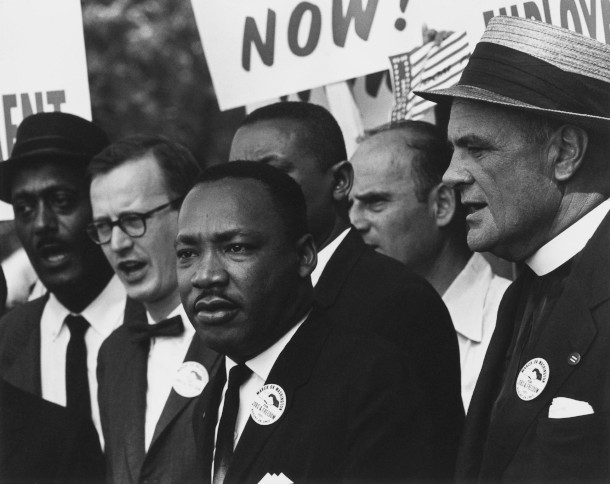
Faith leaders have often led like Black communities through sociocultural movements, such as Rev. Martin Luther King Jr. and the Civil Rights Movement. (Photo: U.S. National Archives and Records Administration, Wikimedia Commons, CC0)
Just as the enslavement of people was driven by commercial interests, today the enslavement of nature for profit violates a morality that sees value in all living things, according to the Rev. Mariama White-Hammond, pastor of New Roots AME Church in Dorchester, Massachusetts. She joins Host Steve Curwood to reflect on how overcoming slavery, which is celebrated on Juneteenth, can inspire us to find ways to depend on each other so we can thrive in a world of ecological justice.
Transcript
CURWOOD: From PRX and the Jennifer and Ted Stanley Studios at the University of Massachusetts, Boston, this is a special Juneteenth edition of Living on Earth. I’m Steve Curwood.
The federal holiday Juneteenth celebrates the enforcement of President Lincoln’s Emancipation Proclamation in Texas in June of 1865. By December, all of the four million or so persons of African descent who were enslaved at the beginning of the Civil War were finally freed by a constitutional amendment. But freedom did not bring full equality, and discrimination led to housing and employment patterns that today still disadvantage Black people in terms of economic and environmental security. Just as the enslavement of people was driven by commercial interests, today the enslavement of nature for profit violates a morality that sees value in all living things, according to the Rev. Mariama White Hammond. And that is why she sees celebrating Juneteenth and the casting off of the shackles of slavery as a way the Black experience can help lead the broader society to freedom. Freedom from the ravages of ecological devastation, toxic exposure and the climate emergency. Her nearly 600-acre playground while growing up in a predominantly Black neighborhood of Boston was Franklin Park, the jewel of the city's Emerald Necklace designed by legendary landscape architect Frederick Law Olmstead, of Central Park fame. Since those childhood days, Mariama White-Hammond has never forgotten nature. She is the former Chief of Environment, Energy, and Open Spaces for the City of Boston and leads the New Roots African Methodist Episcopal Church in Dorchester, Massachusetts. She’s also an activist who has been arrested protesting a natural gas pipeline and is active in the Green Justice Coalition. Today Mariama White-Hammond joins us to celebrate how overcoming slavery can inspire us to find ways to depend on each other so we can thrive in a world of ecological justice. Pastor, Welcome to Living on Earth.
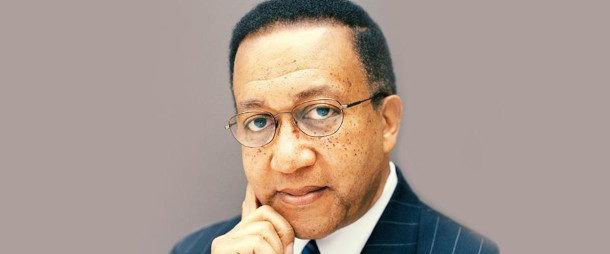
Reverend Dr. Ben Chavis coined the term “environmental racism” and is considered a founding leader in the environmental justice movement. (Photo: MeetDrBen, Wikimedia Commons, CC BY-SA 3.0)
REV. WHITE-HAMMOND: It's good to be here.
CURWOOD: Great to have you. So, Mariama, we're speaking to you about the celebration of Juneteenth. Tell me, what does this holiday mean to you, not just in the 1865 sense, but in the 2025 sense? Why is it important to celebrate Juneteenth today?
REV. WHITE-HAMMOND: Yeah, so I grew up not in Texas. So I had, we do have friends in Texas, specifically friends in Galveston, for whom this was a huge holiday, and it's on my bucket list to get there for one of the full-on Texas celebrations. But I grew up knowing about the holiday, and there has been a gathering in Franklin Park in the city of Boston for as long as I can remember. And so, you know, I've known of the traditions and for us here, it's really just been a time about joy, a time for folks to gather, a time for people to remember that, truthfully, our engagement in this country did not start in a joyful way, but that we also have been in this country for a long time. We have been shaped by our experience here. We are also shaped by the influence of our ancestors and all of the traditions that that brought. And it's just a season also to remind ourselves that in the midst of all of the challenges, there has also always been a joy, a celebration, a sense of community. And most Juneteenth gatherings are held here in the city of Boston and around the country, often in natural places and parks in, in lands that mean something to us. And I grew up going to Franklin Park, which was up the street from my house.
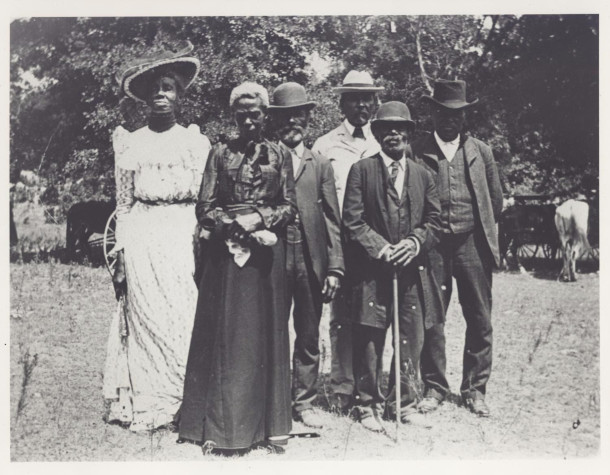
Juneteenth has been celebrated in Texas since 1866. A 1900 celebration in Texas is pictured above. (Photo: Mrs. Charles Stephenson (Grace Murray), Wikimedia Commons, Public domain)
It's the place where we also have the kite festival. It's the place where sometimes we would go and ride our bikes because it was a safe place to do so and so, yeah. So, I grew up with Juneteenth in that way, but I think it has taken on a whole other level of significance since 2020 obviously, with the death of George Floyd and the, the uprisings that followed after that. It was so close to the annual celebration of Juneteenth that it was a moment of deep reflection. I think it was a deep reflection for this country. It was a deep reflection for many of us in Black communities, and I'd been working on criminal justice and police reform issues before George Floyd, but we saw lots of new people pay attention. The video really struck people in a way that sparked a national conversation, and, quite frankly, also has played out in this national backlash. So, I think it was interesting, I know people who planned Juneteenth events, who did them before it became a national holiday, who've started doing them since it's become a national holiday. And one of the big challenges this year is everybody was sort of asking, is it still gonna be a national holiday? I mean, we've seen so many executive orders fire people quickly, change things quickly. It wasn't always clear to us whether or not Juneteenth would still be celebrated. And to be honest with you, you know, I think not until we finish the day all the way out, will I be 100% sure that it's gonna be honored completely. But regardless of how it is conceived on a national scale, for those of us who celebrated the holiday before, we will continue to remember that black people have a deep, long-standing connection to this land, both with a lot of pain attached to it and great joy.
CURWOOD: And by the way, I went to grade school in Roxbury, and I remember how wildly natural Franklin Park is where this big party would happen.
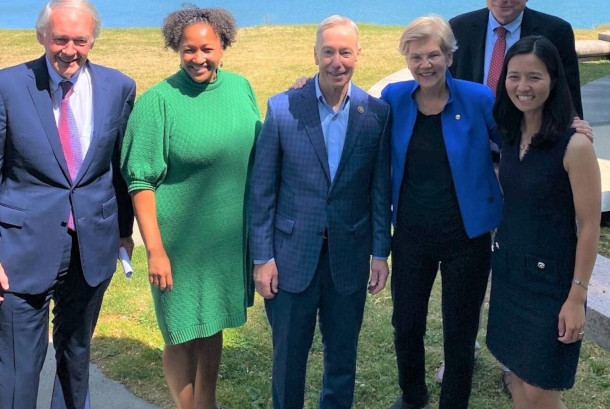
From left to right: Sen. Ed Markey (D-MA), Rev. White-Hammond, Rep. Stephen Lynch (D-MA-8), Sen. Elizabeth Warren (D-MA), and Boston Mayor Michelle Wu in 2022. At the time, Rev. White-Hammond was serving as Boston’s Chief of Energy, Environment, and Open Space. (Photo: Office of Senator Elizabeth Warren, Wikimedia Commons, Public Domain)
REV. WHITE-HAMMOND: Yes.
CURWOOD: Talk to me about the connection between the African American community and that vast expanse of green in Franklin Park. It's not just a little old park, it's hundreds of acres in the middle of the city.
REV. WHITE-HAMMOND: Yes, yes. So, I grew up in so many different events in Franklin Park, I mean, and to be honest with you, you know sometimes as a kid, you don't understand how important, how beautiful something is, until you find out that some people don't have the same thing. So, Franklin Park is 527 acres in the middle of a major city, and it is a place of respite. It is a place of joy. There's a whole walking community that's there. It's a place where people really have the ability to slow down. But there are so many festivals. The Puerto Rican festival, when I was growing up, was a whole week there. The Caribbean festival ends there. There's a zoo there. Like there are so many different activities, major things that mark our year and that are a source of celebration, like Juneteenth, that happened in that park.
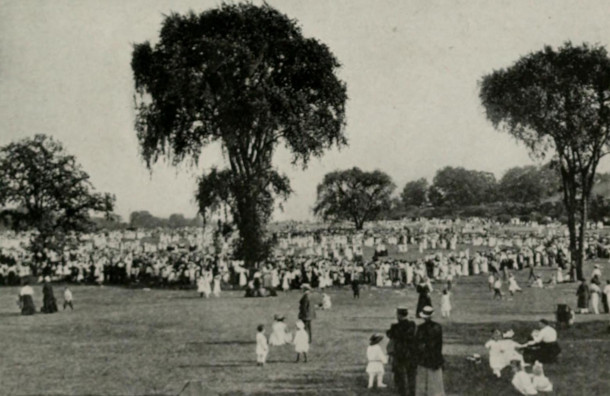
A festival in Boston’s Franklin Park in the early 20th century. (Photo: Internet Archive Book Images, Wikimedia Commons, no use restrictions)
And so I am so thankful for that resource. And as you mentioned, I was the Chief of Environment, Energy and Open Space, and so in that role, I got to oversee city's parks department, and I had the opportunity to spend a lot of time in Franklin Park, and as I'd always done, but also to be a steward for Franklin Park. And the other day, I was there running, I'm, you know, preparing to do a half marathon, and I was running around the park, and I heard chainsaws going, and I said, oh, you know, I wonder what's happening. And I knew that while towards the end of my tenure, we were working to make sure that Franklin Park had a whole crew dedicated to it, and that there was more support and resources because it is 527 acres, it needed to have its own support system. And as I rounded the corner, I saw a group of young men cutting down a tree. Clearly the tree was dead. You could tell that it had seen better days, and they were the young people from PowerCorps. So PowerCorps Boston was a program that I helped to start during my time at the city, and it's a program that trains young folks from the surrounding neighborhoods around Franklin Park, Mattapan, Dorchester, Roxbury, and also the neighborhood of East Boston. Specifically, those are areas where we recruit from the most, and they were part of our tree division that also was started under my tenure, where we moved it out of regular park maintenance and made our own tree division and hired young people that trained in the program. And it was just the joy of my day to finish my run seeing a group of young men from my neighborhood. One of them had just been promoted to become a foreperson, so he was like, moving up the ladder already. And I actually was taken aside by one of the guys who runs that crew, and he said to me, because I remember when I first proposed it, and I, you know, he was a bit skeptical. He had seen people come in and have big ideas before, and he didn't think it was going to come together. And he said to me, Chief, it really is working, like these guys are great, and he's going to retire in two years. And so, I'm really thankful to Joe for the important work that he's done, but also that we are training a new generation of young people to care for that park. Young people that grew up around that park are in there, and they'll be in there, and a couple of days before Juneteenth, cleaning everything up and making sure that it's ready for the people that come to revel there, and that, I'll have to say, it's, I don't know if there's anything that's brought me so much joy in the past couple of weeks. So yes, there's all sorts of things going on. And the administration cut the AmeriCorps program, which means that some of the positions that those young people came up through are at risk, but I felt the sincere joy that the investment that we made in those young people and in that natural space that has sustained so many people that that will keep moving forward, regardless of what is happening.
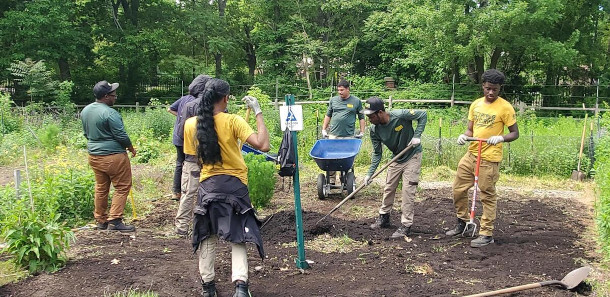
Rev. Mariama White-Hammond helped to start PowerCorps Boston, a program that supports local environmental stewardship by providing training and career readiness support to young adults in the green industry. (Photo: PowerCorps Boston)
CURWOOD: So, in 2021 Congress passed a law that created Juneteenth as a national holiday. Joe Biden signed it. Any concerns that you might have about how Juneteenth may be regarded by America now in 2025?
REV. WHITE-HAMMOND: So, I am grateful that Juneteenth became a national holiday. I hope that continues. I think it would be a backwards move for us to remove it. That being said, Juneteenth is a holiday that celebrates joy as an act of resistance. And we don't need national legislation to keep that spirit alive. I think the spirit of Juneteenth is the reality that, as we say in the in the church, this joy that I have, the world didn't give it, and the world can't take it away. The federal government did not give us the resilience we have, and it cannot take it away. So I hope, I hope we don't take it away, and instead we build on that legacy. But if there is a backlash, if we move backward, it won't be the last time, unfortunately, and it certainly won't be the first time that black folks have seen that happen. We will continue to function in joy. We will continue to remember our ancestors. We will continue to gather.
Links
The Juneteenth National Independence Day Act of 2021
The National Museum of African American History and Culture | “The Historical Legacy of Juneteenth”
Living on Earth wants to hear from you!
Living on Earth
62 Calef Highway, Suite 212
Lee, NH 03861
Telephone: 617-287-4121
E-mail: comments@loe.org
Newsletter [Click here]
Donate to Living on Earth!
Living on Earth is an independent media program and relies entirely on contributions from listeners and institutions supporting public service. Please donate now to preserve an independent environmental voice.
NewsletterLiving on Earth offers a weekly delivery of the show's rundown to your mailbox. Sign up for our newsletter today!
 Sailors For The Sea: Be the change you want to sea.
Sailors For The Sea: Be the change you want to sea.
 The Grantham Foundation for the Protection of the Environment: Committed to protecting and improving the health of the global environment.
The Grantham Foundation for the Protection of the Environment: Committed to protecting and improving the health of the global environment.
 Contribute to Living on Earth and receive, as our gift to you, an archival print of one of Mark Seth Lender's extraordinary wildlife photographs. Follow the link to see Mark's current collection of photographs.
Contribute to Living on Earth and receive, as our gift to you, an archival print of one of Mark Seth Lender's extraordinary wildlife photographs. Follow the link to see Mark's current collection of photographs.
 Buy a signed copy of Mark Seth Lender's book Smeagull the Seagull & support Living on Earth
Buy a signed copy of Mark Seth Lender's book Smeagull the Seagull & support Living on Earth

